Key takeaways:
- Music education fosters creativity, confidence, and essential life skills such as teamwork and discipline, impacting both personal growth and cognitive development.
- Different teaching methods like Orff, Kodály, and Suzuki play a significant role in making music education engaging and accessible.
- Challenges in music education include unequal access to resources, pressure from standardized testing, and the struggle to balance music with other academic demands.
- The future of music education will likely be shaped by technology, collaborative projects, and a focus on inclusivity to ensure diverse student voices are heard.
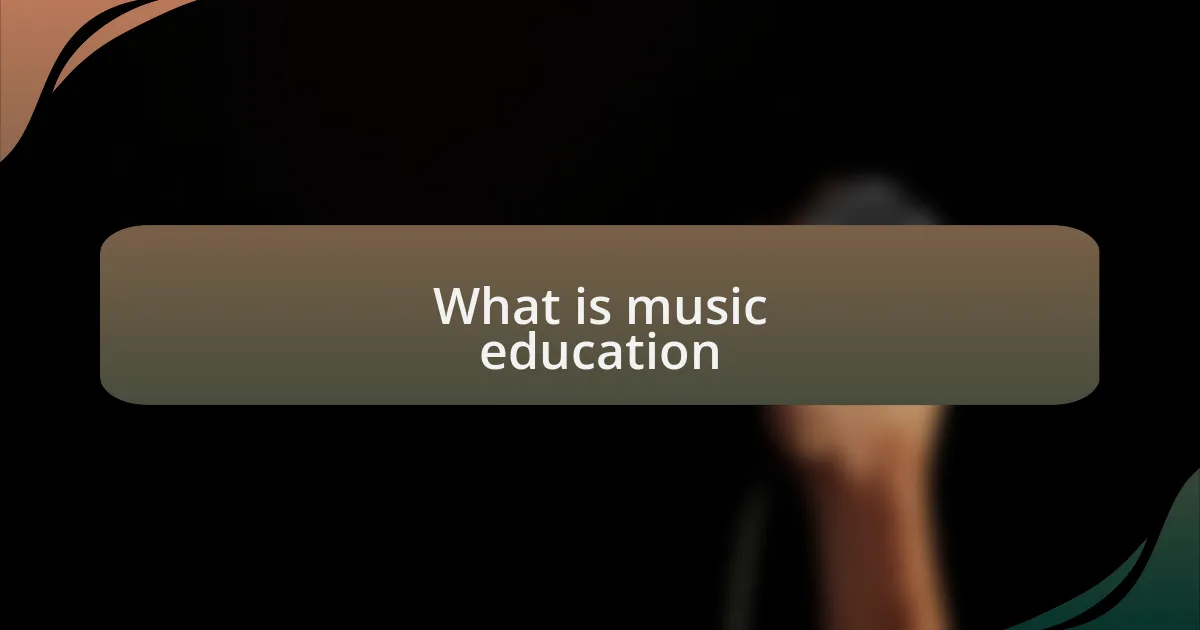
What is music education
Music education encompasses the teaching and learning of music skills, theory, and appreciation. It’s not just about learning to play an instrument or read sheet music; it involves understanding the cultural context of music and its emotional impact. I often think back to my first music class, where the teacher shared stories about famous composers and their struggles, sparking a deeper connection to the music itself.
In my experience, music education fosters creativity and confidence in students. I recall a particular project where we had to compose our own pieces; it was exhilarating to express my emotions through music. Does anyone else remember the pride that came with sharing their own creation? It’s moments like these that make music education profoundly transformative, as it empowers individuals to find their own voice.
At its core, music education serves a broader purpose beyond mere skill acquisition. It teaches teamwork, discipline, and critical thinking as students learn to collaborate in ensembles or tackle complex compositions. Reflecting on my journey, I believe these qualities are what truly resonate long after the final note fades away.
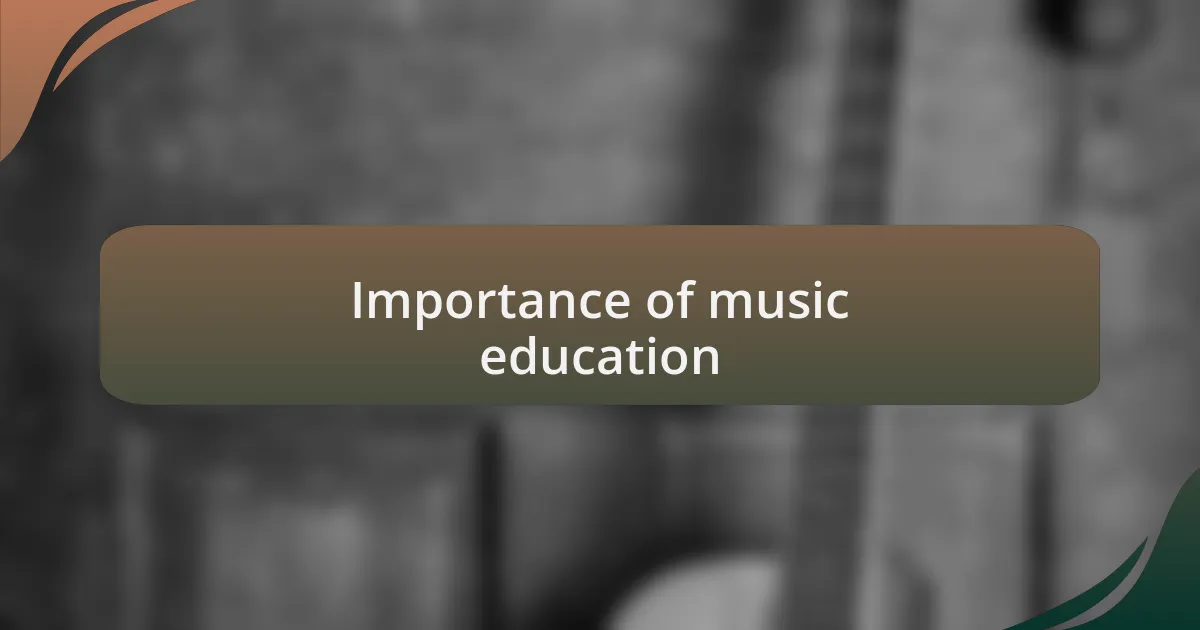
Importance of music education
Music education is vital for developing not just musical skills, but also essential life skills. I remember a time in band practice when a missed note led to a discussion about perseverance and support among peers. This collective effort to overcome mistakes taught me that music is a powerful vehicle for building resilience and camaraderie. Have you ever felt that sense of unity when playing in a group? It’s something truly special.
In addition to social benefits, the impact of music education on cognitive development is remarkable. Studies have shown that engaging with music can enhance memory, attention, and even mathematical skills. I noticed this firsthand when I tackled music theory—suddenly, patterns in notes mirrored patterns in math. It raised a question: How does the brain connect different disciplines in ways we might not even realize? Exploring that connection opened up new dimensions in my understanding of both subjects.
Furthermore, music education promotes emotional expression and mental well-being. I think back to my experiences during challenging times when music became my solace. It’s incredible how a few chords can evoke powerful feelings or provide comfort. This aspect of music education often gets overlooked, but isn’t it crucial to recognize how music can be a release, helping us navigate life’s ups and downs?
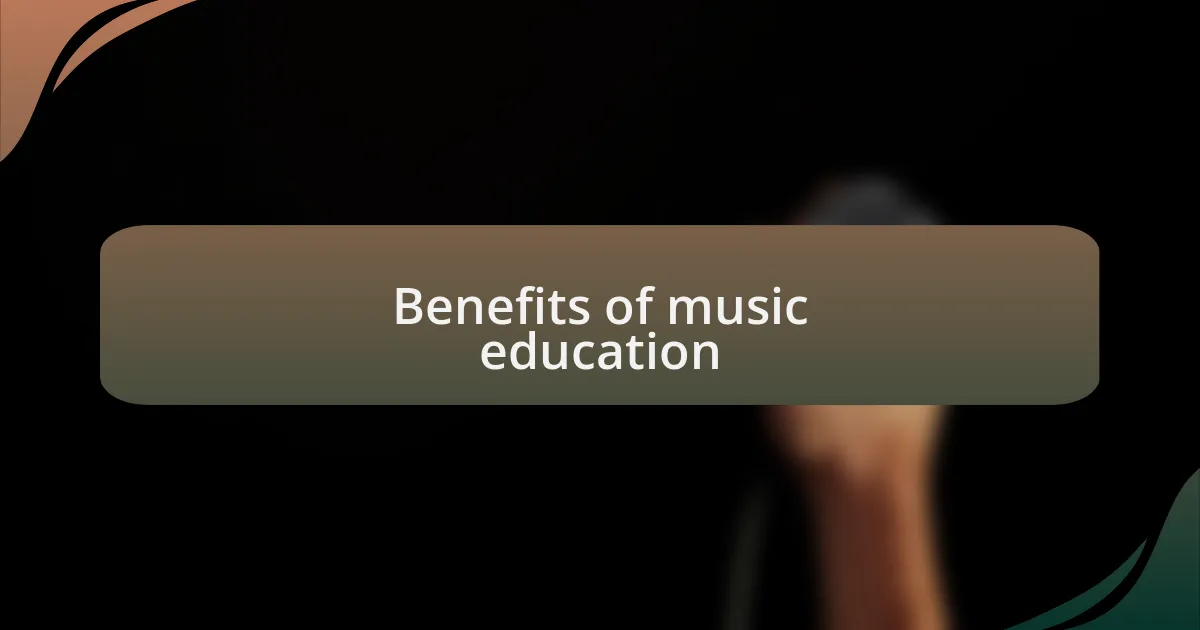
Benefits of music education
One of the most profound benefits of music education is its influence on brain development. I recall my own journey learning to play the piano; it felt like unlocking a part of my brain that had been dormant. The coordination between my hands and the mental processes involved in reading sheet music sparked a transformation in my ability to focus and multitask. Have you ever experienced that ‘aha’ moment when a new skill just clicks? The brain’s adaptability is truly remarkable, especially when it comes to mastering an instrument.
Additionally, music education fosters creativity, which is essential in all aspects of life. I remember composing a short piece for a school project and feeling a rush of pride seeing my ideas come to life. This process challenged me to think outside the box and explore different ways to express myself. Isn’t it fascinating how creating something from nothing can empower us in so many ways? Music teaches us to innovate and approach problems with a fresh perspective.
Moreover, engaging in music can significantly enhance discipline and time management skills. When I committed to regular practice sessions, I learned how to allocate my time efficiently. There were times when I had to prioritize practice over other activities, but that sense of accomplishment felt incredibly rewarding. How often do we underestimate the power of discipline in our daily lives? Music has shown me that consistency and commitment can lead to personal growth in ways I never expected.
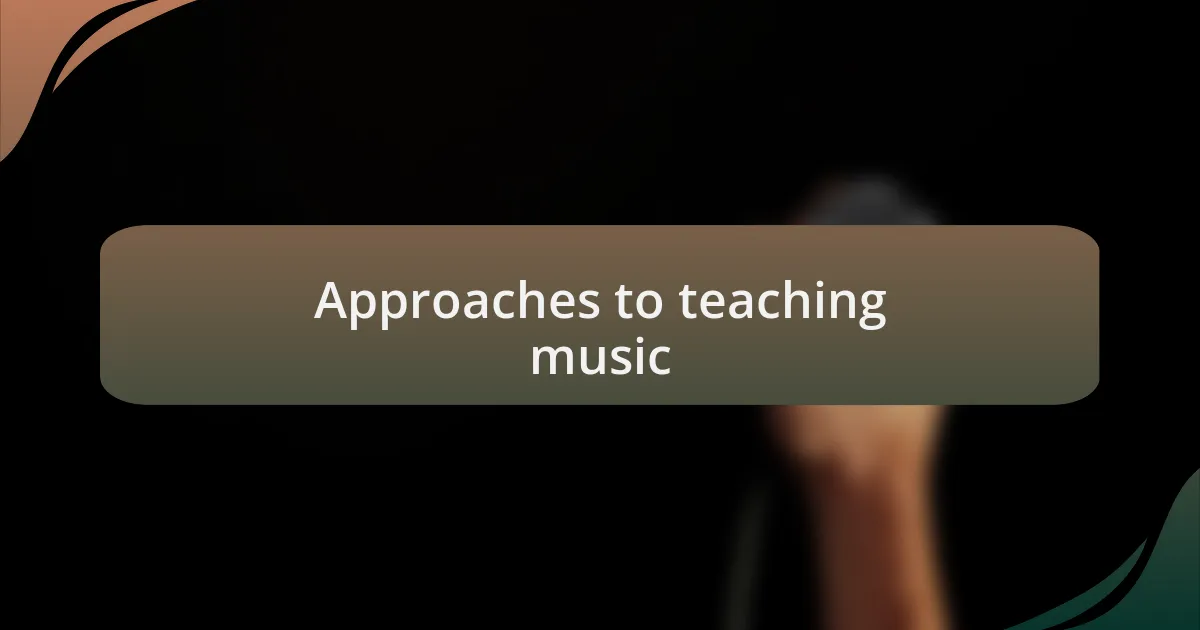
Approaches to teaching music
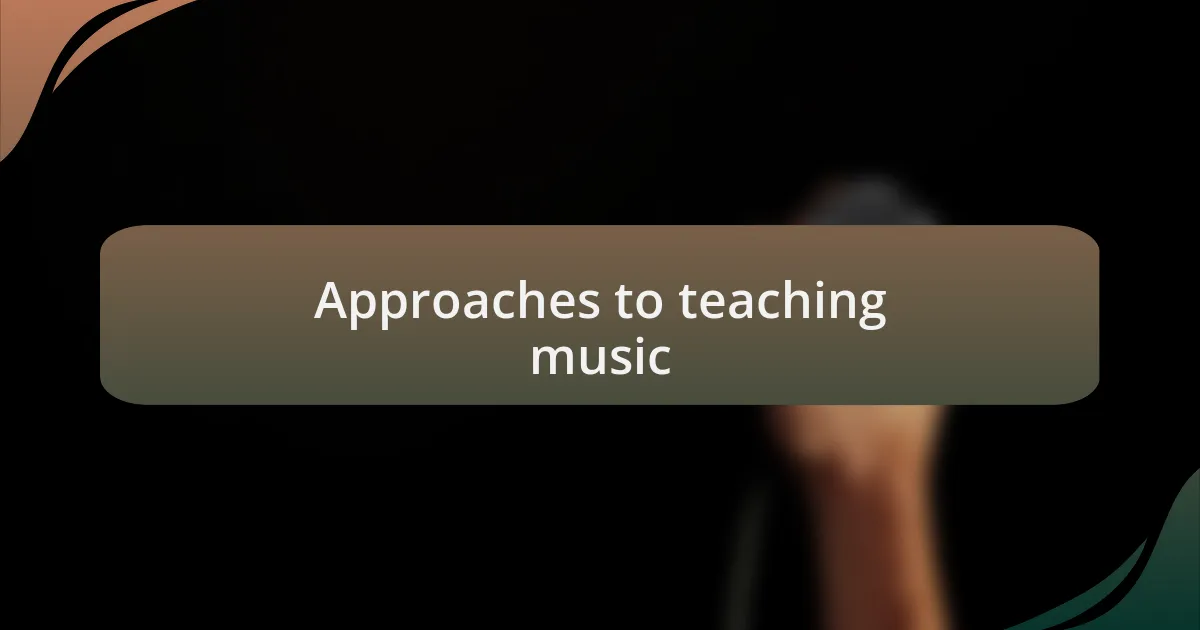
Approaches to teaching music
One effective approach to teaching music is the Orff Method, which emphasizes learning through play. I remember my music teacher incorporating folk songs and rhythmic games into our lessons. It made learning fun and engaging, transforming what could have been dry theory into a lively experience. Isn’t it easier to remember something when it’s associated with joy?
Another method that resonates with me is the Kodály approach, where students learn to sing before they play an instrument. I found that this foundational skill not only improved my musical ear but also helped me appreciate melodies more deeply. How often do we take for granted the beauty of simply singing? Connecting emotionally to music from the outset can lay the groundwork for a lifelong appreciation of the art form.
Lastly, I can’t overlook the benefits of the Suzuki Method, which focuses on early childhood music education and encourages learning through listening. I vividly recall listening to recordings of violin pieces before I even picked up the instrument. That exposure was like having a musical sense awakened within me. Doesn’t it make sense that our surroundings can shape how we perceive and create music? These varied approaches highlight the importance of nurturing a love for music in a way that’s relatable and enjoyable for each learner.
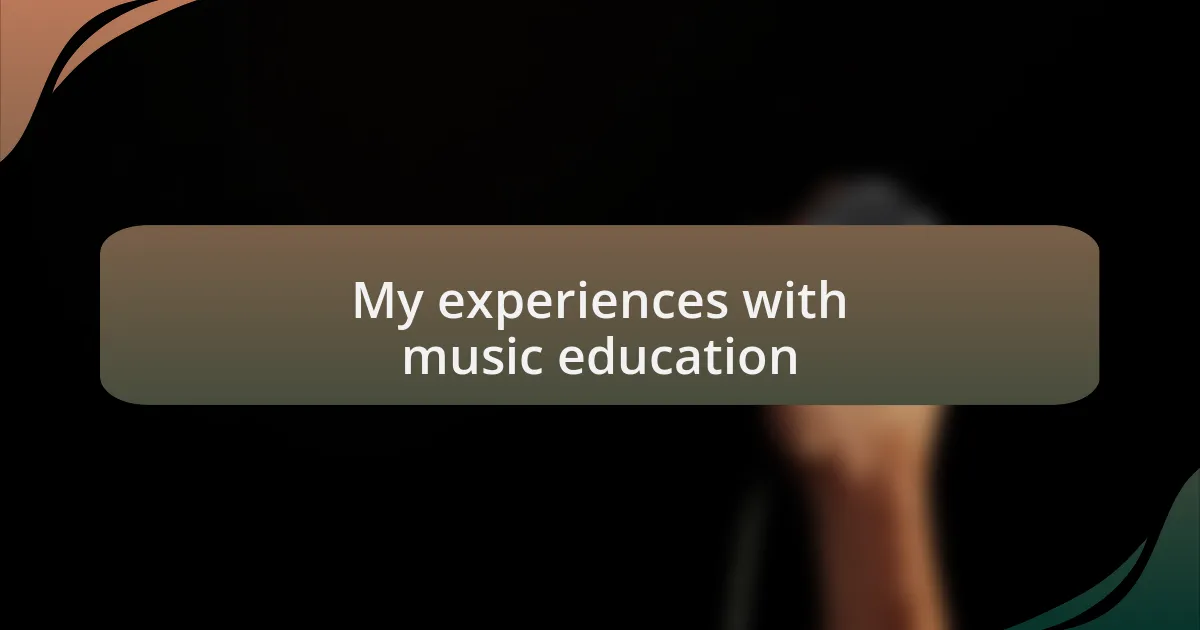
My experiences with music education
My journey through music education has been nothing short of transformative. I remember being terrified before my first performance, feeling the weight of expectation on my shoulders. Yet, when I stepped onto the stage and felt the warmth of the audience, all my nerves faded away. Isn’t it incredible how music can forge connections between strangers?
During group classes, I discovered the power of collaboration. Being part of a small ensemble taught me the importance of listening, not just to my own instrument, but to those around me. I still cherish those moments when we created harmony together, learning that music is more than just individual skill; it’s about creating something beautiful as a team. Have you ever felt that rush of collective creativity?
Reflecting on my lessons with a passionate instructor, I realize how her enthusiasm ignited my own passion for music. She introduced me to composers and genres I had never encountered before, expanding my musical horizons. The thrill of discovering new sounds was palpable, making me eager to delve deeper. How often do we encounter a teacher who inspires us to embrace curiosity?
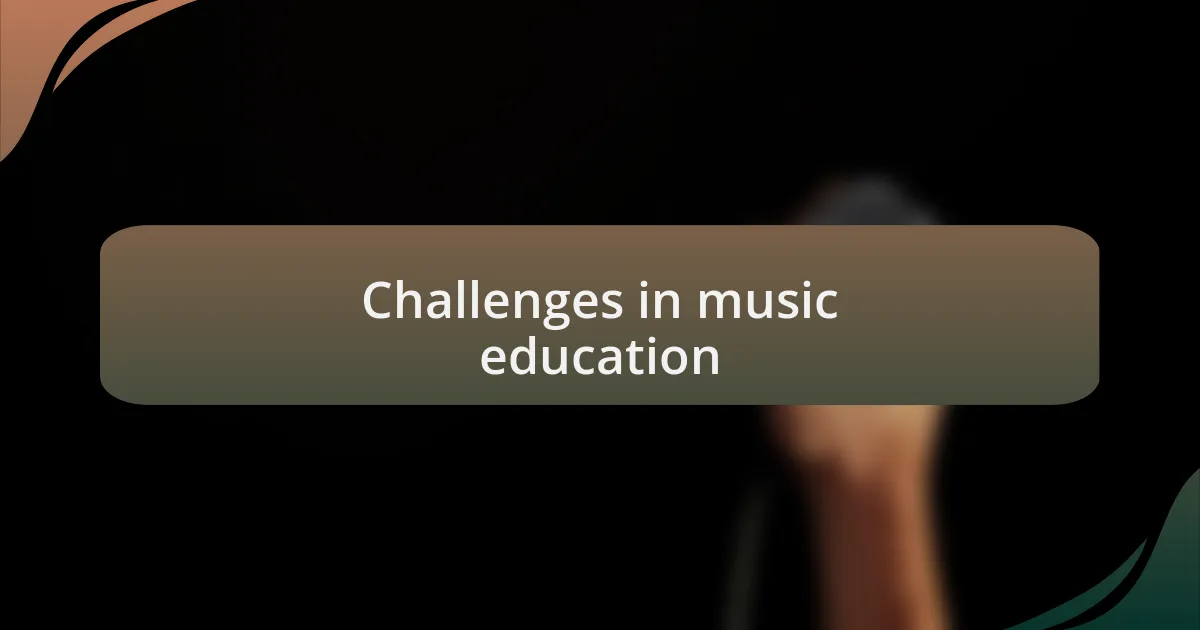
Challenges in music education
One of the biggest challenges in music education is the varying levels of access to resources. I’ve seen firsthand how students in well-funded programs thrive while others in under-resourced schools struggle. It’s disheartening to witness talented young musicians with limited opportunities, as they’re often deprived of quality instruments or knowledgeable instructors. This disparity makes me wonder: how can we bridge this gap and ensure that all students have equal chances to thrive in their musical journeys?
Another significant hurdle is the pressure to conform to standardized testing and curriculum. When I was learning, I sometimes felt stifled by rigid structures that prioritized proficiency over creativity. While assessments have their place, they can overshadow the joy of exploration. Isn’t music supposed to be an expression of individuality? This pressure may discourage students from pursuing their true musical interests, leaving them feeling boxed in.
Lastly, I can’t overlook the challenge of balancing music education with other academic demands. I remember juggling multiple subjects while trying to dedicate time to practice. It often felt overwhelming, leading to burnout rather than inspiration. How many budding musicians have walked away from their instruments because they felt they had to choose? Finding that balance is crucial not just for skill development, but for fostering a lifelong love of music.
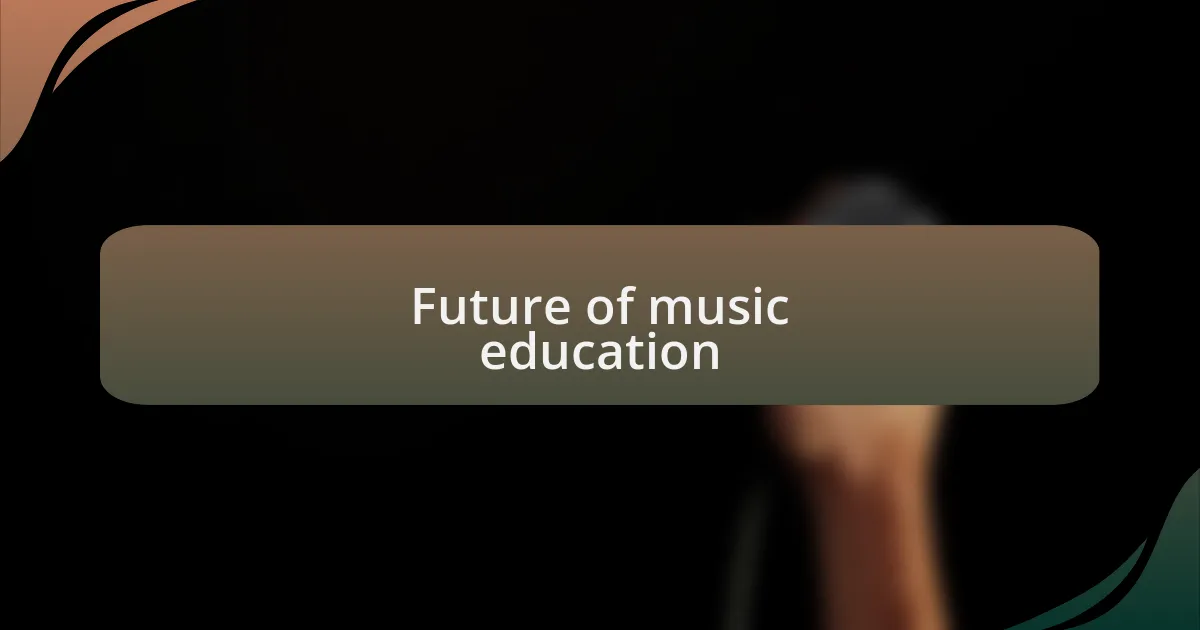
Future of music education
As I envision the future of music education, I believe technology will play a transformative role. With online platforms and apps emerging, students can connect with diverse musical influences and educators around the globe. I often think about how, during my own learning, having access to online tutorials would have expanded my horizons and inspired me to explore genres I never knew existed.
Moreover, the integration of collaborative projects can foster a sense of community among students. I remember participating in a group performance that ignited a lasting passion for teamwork in music. Imagine how many more students could experience that spark if schools encouraged ensemble work or virtual jam sessions, allowing them to learn from each other and celebrate their unique talents.
Looking ahead, we must also consider the importance of inclusivity in music education. Every student, regardless of background or ability, deserves to feel seen and heard. Reflecting on my journey, I often ponder how different my path would have been if there were more opportunities for diverse voices in my early music experiences. How can we ensure the music education landscape truly reflects the richness of our society?